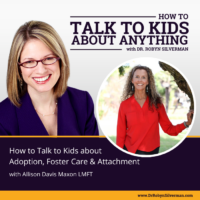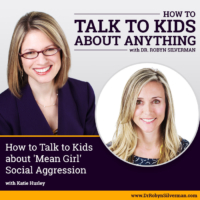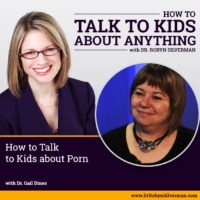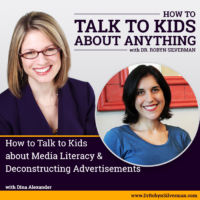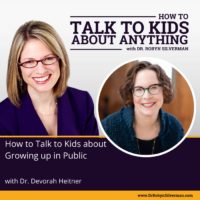Podcast: Play in new window | Download
Subscribe: Apple Podcasts | RSS | More
How to Talk to Kids about Adoption
This podcast will focus on adoption—what it is, what it isn’t and how to talk to kids about it when emotions and fear and love and hope are all wrapped up in it. There is some confusion about adoption and as an adoptive mother of my two kids, I’m excited to bring Carrie Goldman, adoptive mom and writer/founder of the adoption blog, Portrait of Adoption, on How to Talk to Kids about Anything today.
Special Guest: Carrie Goldman
Every year, there are many thousands of adoptions. In fact, there have been estimates of up to 135,000 adoptions per 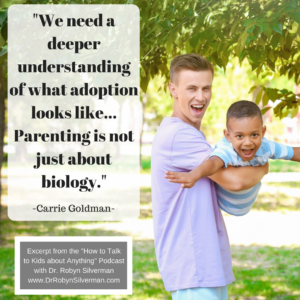 year in the United States alone. Still, there are many misunderstandings about adoption- fueled by hyped up stories in the media and inaccurate assumptions made about the people who place their children for adoption and those who adopt. All of this creates fears and questions for parents who have adopted- how do I talk to my kids about adoption? What if they tell me, while in a fight about brushing teeth or cleaning their room, that they’d prefer to live with their birth parents? What if they want to have more contact with their birth family—is that ok? And really, ultimately, what is healthiest for my child? Kids who were adopted as well as kids who know children who were adopted, may have questions along the way. Why does adoption happen? And what is it all about? Of course the answers are all about good honest communication, solid emotional intelligence, listening and love. Full disclosure? We adopted both of our children and I think adoption rocks.
year in the United States alone. Still, there are many misunderstandings about adoption- fueled by hyped up stories in the media and inaccurate assumptions made about the people who place their children for adoption and those who adopt. All of this creates fears and questions for parents who have adopted- how do I talk to my kids about adoption? What if they tell me, while in a fight about brushing teeth or cleaning their room, that they’d prefer to live with their birth parents? What if they want to have more contact with their birth family—is that ok? And really, ultimately, what is healthiest for my child? Kids who were adopted as well as kids who know children who were adopted, may have questions along the way. Why does adoption happen? And what is it all about? Of course the answers are all about good honest communication, solid emotional intelligence, listening and love. Full disclosure? We adopted both of our children and I think adoption rocks.
Who else thinks adoption rocks? Hopefully you do—but I can tell you that my next guest also thinks it’s pretty awesome as she is an adoptive mom as well.
Carrie Goldman has written for everything from The New York Times, CNN, Psychology Today, Huffington Post, and more. She has made appearances on NPR, BBC, MSNBC, CNN, along with countless other media outlets. Carrie writes one of the nation’s premier adoption blogs, Portrait of an Adoption, which has followers in more than 45 countries. Her acclaimed children’s chapter book, Jazzy’s Quest: Adopted and Amazing, came out in June of 2015, and the sequel, Jazzy’s Quest: What Matters Most, came out in November of 2016. In addition to her adoption expertise, she is also the award-winning author of Bullied: What Every Parent, Teacher, and Kid Needs to Know About Ending the Cycle of Fear (Harper Collins) which we discussed in a previous podcast episode. Bullied has received a National Parenting Publication Award and a Mom’s Choice Award, both at the gold medal level, for excellence in educational skills and tools. You can find more out about our fabulous guest, Carrie Goldman at CarrieGoldmanAuthor.com
The podcast provides:
- Discussion of open, semi-open and closed adoptions
- How to discuss adoption with a child who was adopted
- How to discuss adoption with children who weren’t adopted and don’t know much about the topic.
- What to say when your child yells in anger; “I’d rather live with my birth family!”
- What do you do or say when your child wants to talk to or text his/her birth family?
- If a person has both biological and children who were adopted, how do you deal with the accusation from your child who was adopted that you might love your biological children more?
- If your child wants to find out more about his/her birth family, what can you do? What if information is scarce?
Important Messages:
- There are closed, semi-open, and open adoptions. Details may change over time and situations
- Relationships ebb and flow in adoption as they do in other parts of our lives.
- It’s important to be empathetic and get to know the struggles and situations of the birth family to create a better understanding of adoption. This takes time.
- If you can be more open to open/semi-open adoption there is much less fear. More information can make us feel more secure and less fearful.
- Giving our children their origin story is very important. Even if we don’t know a lot of details, tell what you DO know as it’s vital to their identity. If you don’t give what you know about your child’s origin story, your child may start to make up her own origin story- this can be upsetting and harmful.
- Start the origin story from first point you can- and infer from there, if necessary.
- If you can, visit the area where your child is from!
- “Everybody wants to have a beginning. Everyone wants to have their story so that they’re not constantly going through their life wondering or searching for it or trying to fill in a hole. Giving our children their beginning—their story– is how we make our children whole.” ~Dr. Robyn
- Tell your children their story- but also make sure that once they are old enough, they can tell their story too. How have they internalized it? What do they really know? Listen to them tell their story. Then you can find out what the gaps are.
- Use books to help normalize the varied feelings that come with adoption.
- Meet your kids where they are.
- Teens want to share with us more than you would think! Share in their world!
- If we are giving new information about our child’s adoption or birth when our child is older, it’s important to explain that we made the best decision we could based on the information we had at the time. You might even admit yu were wrong to withhold the information. Perhaps you were scared. You can say; “I loved you so much I was scared that things would change between us if I told you this information.”
- Be honest about your emotions when you have kept a secret. When you are vulnerable- it’s easier for people to understand.
- Give your child space- ultimately your child may get closer to you and feel less like they need to hide their feelings or actions.
Notable Quotables:
- “There’s actually less fear when we make room for openness in adoption.”
- “Just like you never have a moment when you know you learned your name, you don’t want a moment when they suddenly learned they were adopted. Even when the children are young, you can throw in sentences here and there like; ‘We are so glad we adopted you. We love being your parents.’”
- “Origin stories are very important to someone’s sense of identity. As much as we can give someone their origin story, the better.”
- “Psychologically, the children who do best in life are the ones who have a narrative about their life that makes sense to them.”
- “You have to meet kids where they are. That’s part of parenting kids who were adopted or who are biological.”
- “Ask for what you need. If you are not getting what you need, don’t assume the reason, ask.”
- “Parenting is not just about biology.”
- “Getting new information about adoption doesn’t change that I was your mom yesterday and I am your mom today. If you think about the day to day actions that make a parent, I’m today, the same mom as I was to you yesterday. You just have some additional information.”
- “Secrets should be a good thing- an exciting thing. If you have a secret that makes you feel uncomfortable or scared, usually it means that that secret was meant to come out.”
- “We shouldn’t tell people how they feel, we should tell people how we feel.”
- “The most important tip to use when talking to kids and families about adoption is that you always want to be as in touch as possible with your own feelings about why you make the decisions you make. I think when you tell your child that ‘you can or cannot do this,’ they understand more when you give them valid reasons.”
- “A healthy adoption has good boundaries and good communication. It also requires emotional intelligence, the ability to say how you feel and why. Then we need to leave space for our children to respond with how they feel and why—and then listen to them with true consideration.”
- “If we can keep our emotional intelligence in all of our adoption discussions instead of simply coming from a place of defensiveness or fear, we will do better.”
- “Change is expected. We will change. There will be days when we feel good or bad or close or more distant because that’s true of parenting in general. We will have days when we feel more attached to our kids and days we feel more irritated with them. It’s only normal to think we’ll have days when we feel better or worse or stronger or more insecure about adoption.”


